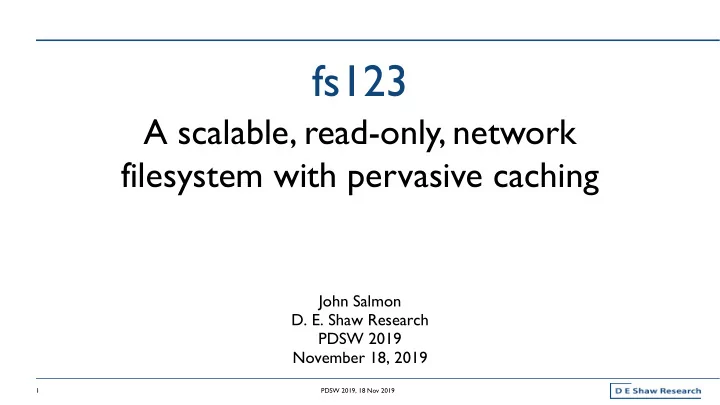

fs123 A scalable, read-only, network filesystem with pervasive caching John Salmon D. E. Shaw Research PDSW 2019 November 18, 2019 1 PDSW 2019, 18 Nov 2019
The Problem • We have >15 petabytes of simulation data and >1 terabyte of code/binaries • Growing at ~10 terabytes/day and ~10 new software packages/versions/day. • POSIX is non-negotiable for executables • Read-only access is sufficient • Three widely distributed data centers, remote workers, laptops, … • NFS is a non-starter PDSW 2019, 18 Nov 2019 2
The solution: fs123 • Read-only distributed POSIX filesystem • How does it work? • Loosely-coupled client-server protocol built on HTTP • Client implements a Filesystem in USErspace (FUSE) filesystem • HTTP origin server exports a backend POSIX filesystem FUSE client Origin server • That’s it! PDSW 2019, 18 Nov 2019 3
The fs123 protocol: map FUSE callbacks to HTTP FUSE client gets callback from kernel: fuse_lowlevel_ops::getattr(req, ino, fi) FUSE client translates that into: HTTP GET http://server/anything/fs123/7/2/a/some/file Origin server replies with: HTTP 200: cache-control: max-age=86400, errno=0, uid=503, gid=503, mtime=1573923416, … FUSE client translates the reply into: fuse_reply_attr(ino, &stat, timeout=86400) PDSW 2019, 18 Nov 2019 4
The software • A single client binary (no special permission required) $ fs123p7 mount http://thesalmons.org:8888/ mtpt • A single server binary (no special permission required) $ fs123p7exportd –port 8888 –export-root=/public/stuff • About 10k lines of C++, available on github (2-clause license): https://github.com/DEShawResearch/fs123 • In production. Critical to our day-to-day scientific operations. PDSW 2019, 18 Nov 2019 5
Why HTTP? • Inherently wide-area • Resilient on intermittent networks • Standardized cache-management strategies • Well understood by sysadmins PDSW 2019, 18 Nov 2019 6
Well understood by sysadmins DNS Client Site A disk Site A Client cache Origin server Site A Caching load balancer Client Site A disk Client Site A Site B cache Caching load balancer Origin server Client Site A disk Client Site C cache Origin server PDSW 2019, 18 Nov 2019 7
Caching is essential for scalability • Kernel caches • indispensable, require careful management • Client-side disk caches • great for hiding network latency and coming back quickly after reboots • Proxy caches (e.g., Varnish, Squid) • essential for wide-area operation PDSW 2019, 18 Nov 2019 8
Caching would be easy if the data were immutable • HTTP Cache-control (RFC 7234) allows proxies to work read-only, mutable data • fs123 adheres to RFC 7234 for its kernel and disk cache • RFC 7234 is not quite enough: • Monotonic validator: “The file you’re asking about has changed since the last time you asked about it, so you (the client filesystem) should flush everything you have cached about its contents”. • Estale cookie: “The file you’re asking about (by name) has disappeared (inode) since the last time you asked about it, so any attempt to see more of it must fail with errno=ESTALE.” PDSW 2019, 18 Nov 2019 9
Try it now https://github.com/DEShawResearch/fs123 IF you’re comfortable running a static Linux binary from my personal URL: $ wget https://thesalmons.org/fs123/fs123p7 && chmod +x fs123p7 $ mkdir mtpt c $ ./fs123p7 mount –oFs123CacheDir=c http://thesalmons.org:8888 mtpt # look around in mtpt: ls, find, cat, emacs (read-only) # if you feel lucky, and have devel versions of libevent, libcurl libsodium $ mkdir build; pushd build $ make –f ../mtpt/GNUmakefile # it’s a fuse daemon. To shut it down, do: $ fusermount –u ../mtpt # or, in a pinch, pkill -9 fs123p7 PDSW 2019, 18 Nov 2019 10
Recommend
More recommend